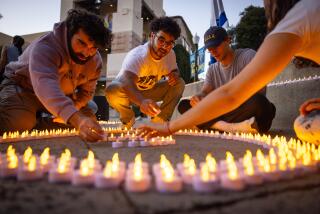Sad Reminder of Slaughter Is Unveiled : Holocaust: About 700 people gather in West Hollywood for dedication of a monument to the victims of a Nazi massacre at Babi Yar in the Soviet Union.
Fifty years after Nazi soldiers killed and burried her parents along with thousands of other Soviet Jews in a ravine near Kiev, Yevgeniva Podolskaya recounted the nightmare to about 700 people gathered in West Hollywood on Sunday to commemorate the massacre at Babi Yar.
She told how she escaped the slaughter by crawling over the dead and dying. “I could see parents trying to cover children with their bodies,” the 67-year-old, gray-haired Los Angeles resident said through a translator.
During Sunday’s sometimes-tearful event, officials unveiled a black granite monument that had been installed at Plummer Park in the heart of Los Angeles’ Russian Jewish community. The word “Remember” is etched on the rock in English, Hebrew and Russian. Soil brought from the original site in Babi Yar was placed at the base of the monument.
Gregory Makaron, president of the Assn. of Soviet Jewish Emigres, told the somber audience that the memory of the Babi Yar slaughter on Sept. 29, 1941, should be kept alive so that it can never be replayed.
“Open the gates of history and let us all behold the nightmarish carnage of that morning,” said Makaron, whose grandfather was among those killed and buried in the ravine.
On that day half a century ago, Nazi soldiers, having overrun Kiev, slaughtered at least 34,000 Ukrainian Jews during a 36-hour killing rampage. The event inaugurated three years of systematic killing.
Before they retreated from Kiev, Nazi soldiers tried to destroy all traces of the massacre by digging up the bodies and cremating them in huge pyres. By the time the Nazi occupation ended in 1943, at least 100,000 bodies--some estimates are as high as 200,000--had been tossed into the ravine.
During the ceremony Sunday, Rep. Howard Berman (D-Panorama City) warned that the renewed nationalism and the economic turmoil in the Soviet Union could reignite anti-Semitic feelings.
“Increased democracy in the Soviet Union is no guarantee that the persecution of the Jews has ended,” he said. “The price of liberty is eternal vigilance.”
Many at the memorial criticized Ukrainian officials for erecting a monument in Kiev that fails to recognize that Jews more than any other group perished there.
“Two tragedies took place in Babi Yar,” said David Chorny, a representative of the Babi Yar Center in Kiev who attended the ceremony in West Hollywood. “The first one was the killing of thousands of Jews, and another tragedy is the Soviet authorities ignoring the first tragedy.”
Many of the people who attended the ceremony had relatives who died at Babi Yar or who narrowly escaped the Nazi invasion of Kiev. Some wept openly as organizers of the event played a famous folk song about the massacre over loudspeakers.
“This blood is of my brothers,” went the Russian song.
But the most emotional portion of the ceremony came when Podolskaya told how she survived the massacre that took the lives of her parents but miraculously spared her two sisters.
She said the Jews of Kiev were ordered to meet on a street corner and forced to remove their clothing and all their valuables. The naked masses were then marched to the edge of the ravine, where they were shot and thrown to the bottom, she said.
Podolskaya said she survived by jumping onto the bodies and lying still. She said the Nazi soldiers fired machine guns into the bodies to make sure they were all dead.
She said she had to wipe blood and flesh from her eyes to see what was happening.
“Hundreds of people were dying all around me,” she said as tears welled up in her eyes.
Podolskaya did not say how she survived after climbing out of the ravine. But when the war was over she said she met up with her sisters and two other girls who survived the massacre.
“The people in the town called us the girls from another world; the girls who came back from the dead,” she said.
After the ceremony, she said that visions of that day continue to haunt her. “It’s like this thing just happened yesterday,” she said. “Every time I tell the story it comes to life in front of my eyes.”
More to Read
Sign up for Essential California
The most important California stories and recommendations in your inbox every morning.
You may occasionally receive promotional content from the Los Angeles Times.











